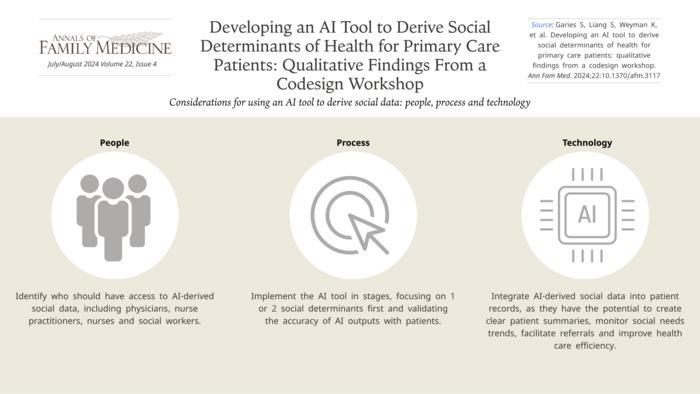Background and Goal: Social determinants of health are the conditions in which people are born, grow, live, work, and age. These conditions include income, education, and access to health care. Knowledge of these factors is essential for primary care clinicians to deliver fair and complete care, plan programs and distribute resources effectively. However, this information is rarely captured consistently in clinical settings. This study identified how an Artificial Intelligence (AI) social determinants of health tool can be designed using a collaborative design strategy with input from primary care team members.

Credit: Annals of Family Medicine
Background and Goal: Social determinants of health are the conditions in which people are born, grow, live, work, and age. These conditions include income, education, and access to health care. Knowledge of these factors is essential for primary care clinicians to deliver fair and complete care, plan programs and distribute resources effectively. However, this information is rarely captured consistently in clinical settings. This study identified how an Artificial Intelligence (AI) social determinants of health tool can be designed using a collaborative design strategy with input from primary care team members.
Study Approach: Semi-structured, 50-minute workshops were conducted with the St. Michael’s Hospital Academic family health team in Toronto, Ontario, Canada from May to June 2023. Participants were asked for their feedback on a proposed AI-based tool that derives patient social determinants of health from electronic health record (EHR) data.
Main Results:
- 15 participants of the health team participated across 4 workshops.
- Participants reported that most patient information was not available or difficult to find in their EHR.
- Participants recommended starting with 1-2 social determinants (such as income and housing). They also emphasized the need for adequate resources, staff, and training materials.
- Many challenges were reported, including how to discuss the use of AI with patients and confirm their social needs identified by the AI tool.
Why It Matters: The integration of AI into health care is rapidly advancing, presenting both opportunities and challenges. This study provides valuable insights from end users on the meaningful design and implementation of an AI-based tool for social data in primary care. The AI-based tool can potentially improve patient care and reduce clinician burnout.
Developing an AI Tool to Derive Social Determinants of Health for Primary Care Patients: Qualitative Findings From a Codesign Workshop
Stephanie Garies, PhD, et al
Department of Family & Community Medicine, St. Michael’s Hospital, Unity Health Toronto, Toronto, Ontario, Canada
PRE-EMBARGO LINK (Link expires at 5 p.m. July 22nd, 2024)
Journal
The Annals of Family Medicine
Article Title
Health Care Providers Weigh In On Their Experiences Developing an AI Tool to Understand Primary Care Patients’ Social Determinants of Health
Article Publication Date
22-Jul-2024



